Office of Student Rights
- Welcome
- ADA Compliance
- ADA Accommodations
- ADA Policies and Procedures
- ADA Grievance Procedure
- Title IX & Sexual Misconduct
- Discrimination & Harassment
- STOPit (Anonymous Reporting Tool)
- Contact Student Rights Department
- Go Back to All Disclosures
Welcome to the Office of Student Rights
At Angeles Institute, we are deeply committed to fostering a safe, inclusive, and equitable environment for all our students. The Office of Student Rights is dedicated to upholding the rights and dignity of every member of our community, ensuring that everyone has the opportunity to thrive academically and personally.
Here, you will find essential resources and support related to:
• ADA Compliance: Information on accommodations and services available to students with disabilities, ensuring equal access to education and campus life.
• Title IX & Sexual Misconduct: Guidance on understanding, reporting, and addressing sexual misconduct, with a focus on prevention and support.
• Discrimination & Harassment: Resources to report and combat discrimination and harassment, promoting a respectful and welcoming community for all.
• Diversity, Equity, & Inclusion: Initiatives, programs, and support aimed at fostering a diverse and inclusive campus environment where every student feels valued and empowered.
Our office is committed to protecting your rights and providing the support you need to succeed. We encourage you to explore the resources available here and reach out to our dedicated team for assistance. Together, we can build a community where respect, inclusion, and equity are at the forefront of our educational experience.
ADA Compliance
Ensuring Equal Access and Opportunity for All Students
At Angeles Institute, we are dedicated to providing an inclusive and supportive environment for students with disabilities. Our commitment to ADA (Americans with Disabilities Act) compliance ensures that all students have equal access to educational opportunities and campus resources.
ADA Accommodations
Accommodations: We offer a range of accommodations to support the diverse needs of our students with disabilities. Whether you require modifications to your learning environment, assistive technology, or other forms of support, we are here to help.
Rights and Responsibilities
Students with Disabilities:
• Have the right to reasonable accommodations that provide equal access to educational programs and activities.
• Must provide current documentation from a qualified professional that substantiates the disability and the need for specific accommodations.
• Are responsible for notifying the ADA Coordinator of their needs and actively participating in the accommodation process.
Angeles Institute:
• Will provide reasonable accommodations to qualified students with disabilities to ensure equal access to academic programs and services.
• Will maintain confidentiality regarding disability-related information.
• Will not discriminate against students with disabilities and will ensure all programs, services, and activities are accessible.
Step-By-Step Process
1. Contact the ADA Coordinator: Begin by reaching out to our ADA Coordinator to discuss your needs. This initial conversation will help us understand your requirements and guide you through the process.
2. Submit Documentation: Provide the necessary documentation from a licensed or certified professional that verifies your disability and specifies the required accommodations. This step is crucial for us to accurately assess your needs.
3. Assessment and Plan Development: The ADA Coordinator will review your documentation and engage in an interactive process with you to develop a tailored accommodation plan. This plan will outline the specific accommodations and support services needed to facilitate your academic success.
4. Implementation: Once the accommodation plan is finalized, the ADA Coordinator will communicate the necessary accommodations to the relevant faculty and staff. This ensures that your accommodations are implemented effectively and in a timely manner.
5. Follow-up: The ADA Coordinator will monitor the effectiveness of the accommodations and provide ongoing support. This may include making adjustments to the accommodation plan as needed to ensure continued accessibility and success.
ADA Policies and Procedures
Introduction:
The Angeles Institute is committed to providing equal access to educational opportunities for students with disabilities in compliance with the Americans with Disabilities Act (ADA) and Section 504 of the Rehabilitation Act of 1973. This policy outlines the procedures and responsibilities for accommodating students with disabilities.
Reasonable Accommodations:
In accordance with Section 504 of the Rehabilitation Act and the Americans with Disabilities Act (ADA) as amended, Angeles Institute abides by the regulation that “no otherwise handicapped individual” shall be excluded from participation in the programs and services offered by the Institute “solely by reason of the handicap.”
Angeles Institute is committed to providing equal access to all of its programs, services, and activities for students with all types of disabilities. Angeles Institute is committed to providing reasonable accommodations including auxiliary aids and/or services to qualified individuals with a disability, unless providing such accommodations would result in undue burden or fundamentally alter the nature of the relevant program, benefit or service provided by the Institute.
A student is eligible for consideration for reasonable accommodations and/or auxiliary aids and services if the student has a disability and the Student Affairs Department has met with the student, consulted with Angeles Institute Administration, and determined that the functional limitations of the disability require such reasonable accommodation, auxiliary aids and/or services (and has been deemed eligible).
The Student Affairs Department facilitates this access by coordinating the application process, reasonable accommodations, and support services. Students who wish to request reasonable accommodations are encouraged to contact the Student Affairs Department to start the process for documenting and determining eligibility for services prior to the start of the program (at least four weeks prior). While this process can be started at any time, reasonable accommodations may not be implemented retroactively. Although some requests for reasonable accommodation (e.g., test-taking time, clinical site assignment, classroom seat placement, etc.) can be implemented immediately once a student has been deemed eligible for services, other accommodations may take up to 4-6 weeks to complete. Please note that students are not eligible to receive reasonable accommodations until the request and eligibility process is complete.
Grievance Procedure:
If a student believes they have been denied reasonable accommodations or has experienced discrimination, they may file a grievance using the following steps:
1. Informal Resolution: The student should first attempt to resolve the issue informally by discussing it with the ADA Coordinator.
2. Formal Complaint: If the issue is not resolved informally, the student may file a formal written complaint with the Office of Student Rights.
3. Investigation: The Office of Student Rights will investigate the complaint and provide a written response within a reasonable time frame.
4. Appeal: If the student is not satisfied with the outcome, they may appeal to the Dean of Students.
•Grievance Procedures: If you encounter any issues or have concerns regarding your accommodations, our grievance procedures provide a clear pathway for resolution.
At the Office of Student Rights, we are committed to supporting your educational experience by ensuring that all students, regardless of ability, have the tools and resources they need to succeed. For more information or to request accommodations, please contact our ADA coordinator.
Title IX & Sexual Misconduct
Promoting a Safe and Respectful Campus Environment
At Angeles Institute, we are committed to maintaining a campus environment that is free from sexual misconduct and discrimination based on sex. Title IX of the Education Amendments of 1972 protects individuals from discrimination based on sex in education programs and activities. We are dedicated to upholding these protections and providing resources and support for those affected by sexual misconduct.
Understanding Title IX and Sexual Misconduct
• Title IX Overview: Title IX prohibits discrimination on the basis of sex in any education program or activity receiving federal financial assistance.
• Sexual Misconduct: This includes sexual harassment, sexual assault, dating violence, domestic violence, and stalking. These behaviors are not tolerated and are addressed promptly and effectively.
Reporting and Resources
How to Report:
• Immediate Reporting: Students who experience or witness sexual misconduct, discrimination, or harrassment are encouraged to report it immediately to ensure swift action.
• Contact the Office of Student Rights Staff: Reach out to our staff for guidance and to initiate a formal complaint process.
• Confidential Reporting: For confidential support, students may contact campus counselors or off-campus resources.
Policies and Procedures
Investigative Process:
• Initial Assessment: The Office of Student Rights staff will conduct an initial assessment to determine the appropriate response to the report.
• Formal Investigation: If warranted, a formal investigation will be conducted, ensuring a thorough and impartial review of the facts.
• Resolution: Based on the findings, appropriate actions will be taken to address and resolve the issue, ensuring the safety and rights of all parties involved.
• Appeal Process: Both the complainant and respondent have the right to appeal the outcome of the investigation if they believe there has been a procedural error or new evidence has come to light.
Prevention and Education
• Training Programs: We provide ongoing training and education for students, faculty, and staff to prevent sexual misconduct and promote a respectful campus culture.
• Awareness Campaigns: Regular awareness campaigns and events to inform the campus community about Title IX rights and resources.
At the Office of Student Rights, we are committed to fostering a safe and respectful environment for all students. For more information or to report an incident, please contact our staff. Your safety and well-being are our top priorities.
Discrimination & Harassment
Commitment to a Respectful and Inclusive Campus
At Angeles Institute, we are steadfast in our commitment to creating and maintaining a learning environment that is free from discrimination and harassment. We recognize that a respectful and inclusive environment is crucial for the academic and personal success of all students. Our policies and procedures are designed to ensure that all members of our community are treated with dignity and respect.
Statement of Non-Discrimination
Angeles Institute does not discriminate on the basis of race, color, religion, national or ethnic origin, sex, sexual orientation, gender identity or status, marital, parental, familial, Veteran, or military service status, age, or disability. Angeles Institute complies with all local, state, and federal laws barring discrimination. Accordingly, equal opportunity for employment and admission shall be extended to all persons. All inquiries or complaints regarding these laws and regulations should be directed to the ADA coordinator or a designated representative, who will provide students with procedures available for resolving complaints relating to alleged unlawful discriminatory actions.
Understanding Discrimination and Harassment
• Discrimination: Any unfair treatment based on race, color, national origin, sex, disability, age, religion, or other protected characteristics.
• Harassment: Unwelcome conduct based on protected characteristics that is severe, pervasive, and objectively offensive, creating an intimidating, hostile, or abusive educational environment.
Understanding Bullying and Academic Dishonesty in Nursing Education
Bullying in nursing education can take many forms, from verbal abuse in the classroom to harassment during clinical rotations. Understanding what constitutes bullying is the first step towards prevention. Here at Angeles Institute, we're committed to providing a safe and supportive environment for all our students.
1. Physical Bullying
While less common in academic settings, physical bullying can occur and includes any form of physical aggression or intimidation. This might be as subtle as invading someone's personal space in a threatening manner or as overt as physical assaults.
Example: A student aggressively blocking another's way in the simulation lab, or unwanted physical contact under the guise of demonstrating a clinical procedure.
2. Verbal Bullying
This involves derogatory comments, insults, or threats spoken to or about someone. In nursing education, this can be particularly damaging given the close-knit nature of clinical groups and the hierarchical structure of clinical placements.
Example: A student repeatedly criticizes another's clinical skills in front of peers or instructors, using demeaning language or making fun of their questions during lectures.
3. Social (Relational) Bullying
Social bullying aims to harm someone's reputation or social standing. This can be through spreading rumors, exclusion from study groups, or public humiliation.
Example: A group of students starts a rumor about another student's competence or personal life, leading to their isolation from group study sessions or clinical partnerships.
4. Cyberbullying
With the rise of digital platforms, cyberbullying has become a significant concern. It involves sending, posting, or sharing negative, harmful, false, or mean content about someone else, often anonymously.
Example: Sharing embarrassing photos from a clinical simulation on social media without consent, or sending threatening emails.
5. Academic Bullying and Dishonesty
Academic bullying undermines a student's performance or integrity, often intertwined with acts of academic dishonesty. This can include stealing someone's work, sabotaging academic materials, or pressuring peers for unauthorized academic advantages. It not only affects individual students but also erodes the academic standards and trust within the educational community.
Academic Bullying Example: A student hides or steals another's clinical logs or assignment materials, or a group refuses to share essential study notes as a form of exclusion.
Academic Dishonesty Example: A student copying another's assignment without consent or using unauthorized materials during an exam, compromising the academic integrity of the nursing program.
6. Pestering for Information
This involves repeatedly bothering someone for personal or academic information, which can be a form of harassment. It's particularly relevant in competitive academic environments where information or resources are seen as a way to gain an advantage.
Personal Example: Constantly messaging or approaching a student to share details about their personal life, relationships, or struggles, despite their discomfort or refusal.
Academic Example: Insistently asking peers for answers to assignments, access to their personal study materials, or questions from a recent exam they haven't taken yet, creating pressure and discomfort.
Addressing These Types of Bullying
Understanding these types of bullying is crucial for creating a supportive and respectful learning environment. Angeles Institute encourages all students to use the STOPit Reporting Page to report any incidents of bullying, ensuring that everyone can learn and work in a safe, positive setting. Through education, awareness, and proactive intervention, we can collectively address and prevent bullying in all its forms, fostering a culture of respect and empathy within our nursing programs.
Reporting and Resources
• How to Report:
• Immediate Reporting: Students who experience or witness discrimination or harassment are encouraged to report it immediately to ensure swift action.
• Contact the Office of Student Rights Staff: Reach out to our staff for guidance and to initiate a formal complaint process.
• Confidential Reporting: For confidential support, students may contact campus counselors or off-campus resources.
Prevention, Education & Resources
Bullying Prevention Strategies: At Angeles Institute, we believe in proactive prevention by calling on our students and faculty to utilize the STOPit tool to recognize and stop bullying before it escalates.
Community Role: Creating a supportive environment is a collective effort. We encourage open dialogue, mutual respect, and active participation in our anti-bullying programs. Together, we can make a difference.
Internal Support Services:
If you're feeling overwhelmed, contact our student affairs office at 562-531-4100 or studenaffairs@angelesinstitute.edu to schedule a confidential appointment.
External Resources:
For additional support, these trusted organizations offer valuable resources on bullying prevention and mental health:
National Bullying Prevention Center
Support Services
• Counseling and Health Services: Confidential counseling and health services are available to support students affected by discrimination and harassment.
STOPit (Anonymous Reporting Tool)
What is STOPit?
At Angeles Institute, we're dedicated to fostering a safe, supportive, and inclusive learning environment for all our students. That's why we've partnered with STOPit, a leading technology platform designed to empower students to stand up against bullying and harassment. STOPit offers a simple, anonymous way to report incidents directly from your smartphone, ensuring your voice is heard while protecting your privacy.
With STOPit, we're taking a proactive step towards eliminating bullying and intimidation in our nursing programs, making it easier for everyone to focus on what truly matters—your education and well-being. Join us in creating a culture of respect, empathy, and support, where every student has the tools to thrive in a positive and secure learning atmosphere.
Discover More About How STOPit Can Help You
How It Works: The STOPit app allows you to report bullying incidents directly from your smartphone. With just a few taps, you can send an anonymous report, including text and photos, to our student affairs team for immediate action.
Features Highlight:
- Anonymous Reporting: Your identity is protected, encouraging you to report without fear of retaliation.
- Real-time Messaging: Communicate with student affairs anonymously for advice and support.
- Incident Management: A streamlined process ensures your report is addressed promptly and effectively.
Download Section: Ready to take action? Download the STOPit app now.
Web Browser:
QR Code:

Understanding Bullying and Academic Dishonesty in Nursing Education
Bullying in nursing education can take many forms, from verbal abuse in the classroom to harassment during clinical rotations. Understanding what constitutes bullying is the first step towards prevention. Here at Angeles Institute, we're committed to providing a safe and supportive environment for all our students.
1. Physical Bullying
While less common in academic settings, physical bullying can occur and includes any form of physical aggression or intimidation. This might be as subtle as invading someone's personal space in a threatening manner or as overt as physical assaults.
Example: A student aggressively blocking another's way in the simulation lab, or unwanted physical contact under the guise of demonstrating a clinical procedure.
2. Verbal Bullying
This involves derogatory comments, insults, or threats spoken to or about someone. In nursing education, this can be particularly damaging given the close-knit nature of clinical groups and the hierarchical structure of clinical placements.
Example: A student repeatedly criticizes another's clinical skills in front of peers or instructors, using demeaning language or making fun of their questions during lectures.
3. Social (Relational) Bullying
Social bullying aims to harm someone's reputation or social standing. This can be through spreading rumors, exclusion from study groups, or public humiliation.
Example: A group of students starts a rumor about another student's competence or personal life, leading to their isolation from group study sessions or clinical partnerships.
4. Cyberbullying
With the rise of digital platforms, cyberbullying has become a significant concern. It involves sending, posting, or sharing negative, harmful, false, or mean content about someone else, often anonymously.
Example: Sharing embarrassing photos from a clinical simulation on social media without consent, or sending threatening emails.
5. Academic Bullying and Dishonesty
Academic bullying undermines a student's performance or integrity, often intertwined with acts of academic dishonesty. This can include stealing someone's work, sabotaging academic materials, or pressuring peers for unauthorized academic advantages. It not only affects individual students but also erodes the academic standards and trust within the educational community.
Academic Bullying Example: A student hides or steals another's clinical logs or assignment materials, or a group refuses to share essential study notes as a form of exclusion.
Academic Dishonesty Example: A student copying another's assignment without consent or using unauthorized materials during an exam, compromising the academic integrity of the nursing program.
6. Pestering for Information
This involves repeatedly bothering someone for personal or academic information, which can be a form of harassment. It's particularly relevant in competitive academic environments where information or resources are seen as a way to gain an advantage.
Personal Example: Constantly messaging or approaching a student to share details about their personal life, relationships, or struggles, despite their discomfort or refusal.
Academic Example: Insistently asking peers for answers to assignments, access to their personal study materials, or questions from a recent exam they haven't taken yet, creating pressure and discomfort.
Addressing These Types of Bullying
Understanding these types of bullying is crucial for creating a supportive and respectful learning environment. Angeles Institute encourages all students to use the STOPit Reporting Page to report any incidents of bullying, ensuring that everyone can learn and work in a safe, positive setting. Through education, awareness, and proactive intervention, we can collectively address and prevent bullying in all its forms, fostering a culture of respect and empathy within our nursing programs.
Reporting Bullying
At Angeles Institute, we understand the importance of addressing bullying promptly and effectively. That's why we've made it easier than ever to report incidents through the STOPit app. Here's how it works:
- Anonymously Report Incidents
When you report an incident of bullying through the STOPit app, you'll receive a unique incident ID number. This number allows you to track the progress of your report while maintaining your anonymity. Be sure to save your incident ID # and Passcode so you can retrieve your incident report later. We take every report seriously, and your courage to come forward is the first step toward making our community safer.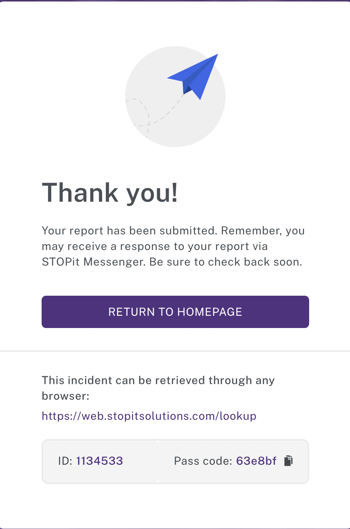
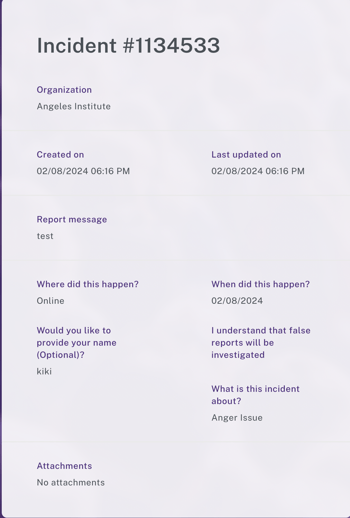
- Stay Updated
After submitting your report, you'll receive updates directly through the app by signing in with your incident report and passcode. Our dedicated team will review your report and take the necessary steps to address the issue. You'll be informed of the actions taken, ensuring transparency and accountability throughout the process.
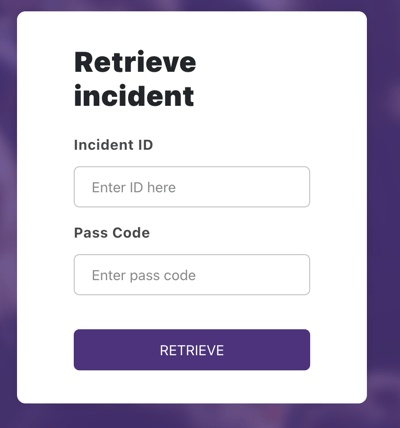
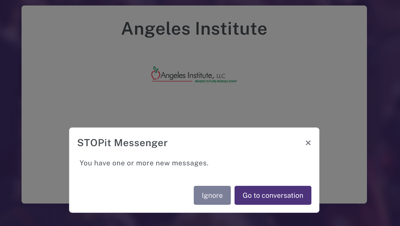
- Anonymous Chat for Follow-Up
If further information or follow-up is needed, you can chat anonymously with our team right from your phone. This feature allows you to provide additional details, ask questions, and receive support without revealing your identity. It's a secure way to stay involved and informed as we work together to resolve the incident.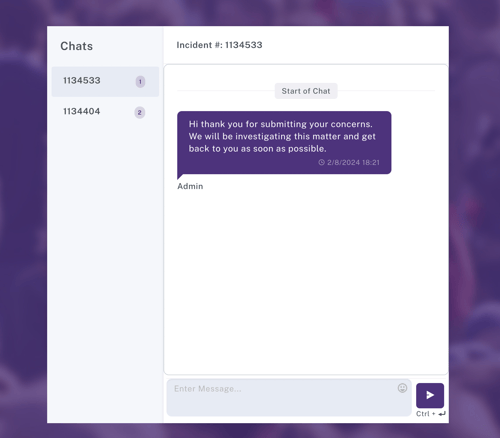
- Check for Requests and Updates
The STOPit app also allows you to log in and check for any requests for additional information or updates on your report. This ensures that you're always in the loop and that your report is being handled with the attention it deserves. Your participation is crucial, and we encourage you to stay engaged while benefiting from the anonymity the app provides.
Reporting bullying is a brave and impactful action. With the STOPit app, Angeles Institute is committed to making this process as supportive and effective as possible. Together, we can create a safer, more respectful community for everyone.
Download Section: Ready to take action? Download the STOPit app now.
QR Code:

Get in Touch with the Office of Student Rights
If you have any questions, concerns, or need support regarding ADA compliance, Title IX, discrimination, harassment, sexual misconduct, or diversity, equity, and inclusion, please do not hesitate to contact us. Our team is here to assist you and ensure a safe and inclusive environment for all members of the Angeles Institute community.
Office of Student Rights Contact Information
• Email: studentrights@angelesinstitute.edu
• Phone: 562-531-4100
• Address: 17100 Pioneer Blvd. Ste 170 Artesia, Ca 90701
Office Hours:
• Monday - Friday: 9:00 AM - 5:00 PM
• Saturday - Sunday: Closed
.png?width=161&height=161&name=Untitled%20design%20(2).png)
562-531-4100 EXT 209
17100 Pioneer Blvd. Ste 170 Artesia, Ca 90701
Ali Robinson is our dedicated ADA Coordinator, ensuring that our institution remains accessible and accommodating to all students. She is committed to fostering an inclusive environment by addressing and supporting the unique needs of students with disabilities. Ali works diligently to develop and implement policies that uphold the principles of the Americans with Disabilities Act, ensuring equal access to educational opportunities for everyone.
Ali’s approachability and genuine concern for student well-being make her an invaluable resource for those seeking assistance with accommodations. She is always ready to listen, provide guidance, and advocate for students, ensuring they have the necessary tools and support to succeed.
Beyond her critical role as ADA Coordinator, Ali brings her dynamic personality and diverse interests to our community. Her passion for exploration, podcasts, culinary creations, and film adds a unique flavor to her interactions, making her not just a coordinator but a well-rounded and engaging presence on campus.
Ali’s dedication and expertise make her an essential part of our team, and we are fortunate to have her championing accessibility and inclusion for all our students.
.png?width=161&height=161&name=Untitled%20design%20(6).png)
Joselyn Lopez Santillan
Student Affairs Supervisor
562-531-4100 EXT 212
17100 Pioneer Blvd. Ste 170 Artesia, Ca 90701
Joselyn is the Student Affairs Supervisor at Angeles Institute, and she's the perfect person to have in your corner during your education journey! Her passion for helping students navigate their academic and personal challenges stems from her experiences as a student. She's been there, done that, and knows how tough it can be, which is why she's always available and willing to assist you with anything you need. Joselyn holds a bachelor's degree in Sociology and minors in Psychology and Spanish from UC Merced. She is always currently enrolled in a certificate program at UC Berkeley to further expand her knowledge and skills. Joselyn's responsibilities are wide-ranging, from assisting with student grievances to linking students with resources like mental health services and childcare. She wants to ensure that you have a safe and comfortable learning environment where you can focus on your education and personal growth. In addition to her hard work, Joselyn loves to unwind by spending time with family and friends, reading, exploring new places, scrapbooking, and taking photographs. Her creativity and dynamic personality are some of the things that make her ideal for her role in student affairs. She's always open to learning new things and has a contagious positive attitude.
Overall, Joselyn is an awesome and approachable person who's passionate about helping students. Her personal experiences and dedication to creating a supportive environment for students make her an invaluable member of the Angeles Institute community. With Joselyn by your side, you can tackle anything that comes your way during your education journey!

Ken Solomon
Title IX Coordinator
562-531-4100 EXT 302
17100 Pioneer Blvd. Ste 170 Artesia, Ca 90701
As the Director of Business Operations and Title IX Coordinator at Angeles Institute, Ken draws upon his extensive experience in business management, information technology, and financial services to lead a diverse group of departments. He brings a wealth of knowledge and expertise to his role, ensuring that all operations run smoothly and efficiently.
Ken is a true advocate for the students of Angeles Institute. He is committed to providing exceptional service and ensuring that all prospective, current, and past students have a positive and professional experience when interacting with the Business Office staff. His dedication to student success is reflected in his leadership style, where he encourages collaboration, open communication, and continuous improvement.
In his role as Title IX Coordinator, Ken is dedicated to ensuring compliance with Title IX regulations, promoting a safe and equitable environment for all students, and addressing any issues related to gender discrimination or harassment.
When he is not in the office, Ken dedicates his time to serving on the boards of non-profit organizations. He is passionate about giving back to the community and making a positive impact in the lives of others. He also enjoys attending sporting and entertainment events, fueling his love for competition and entertainment. Ken is an avid traveler, having visited many parts of the world and experiencing different cultures. These experiences have broadened his perspective and enriched his life, which he brings to his leadership role at Angeles Institute.
Notice To Visitors
Should you have any questions or concerns regarding the contents of this page, please contact us by phone or email.
Contact Us
- info@angelesinstitute.edu
- +1 (562) 531-4100
- 17100 Pioneer Blvd, STE 170, Artesia, CA 90701

